By Katie Ginn
In honor of Pastor Appreciation Month, MCL Editor Katie Ginn recently interviewed five pastors from the Jackson metro area. They discussed their biggest challenges, what brings them hope, and how they would encourage all believers to share Jesus with others. Take time today to thank your pastor!
Meet the pastors
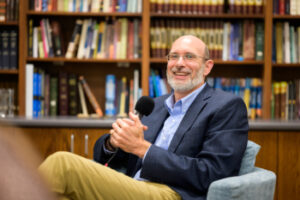
Caleb Cangelosi
Pastor at Pear Orchard Presbyterian in Ridgeland for five and a half years

James E. Turner Sr.
Pastor at Marl Grove COCHUSA in Byram for 15 years “this time” (his second term)

Brad Goad
Pastor at Christ United Jackson for a year and a half

Nevada DeLapp
Pastor at St. Stephen’s Anglican Church in Flowood for five years
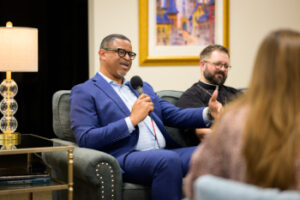
Stanley James
Pastor at True Vine Baptist Church in Brandon for eight years
The interview
Katie Ginn: What’s the biggest challenge for each of you as a pastor?
Stanley James: Post-COVID … Different circumstances, situations, problems. Different needs that have to be addressed. … In my church, I have 45- to 75-year-olds, but then we have our Ignite Youth Ministry … It’s keeping that all together (but then reaching) that group that’s in the middle. That’s the group that we might be losing the grip on. That age group of like 21, that couple that’s just gotten married, they’re educated … and there’s been a kind of drift.
Brad Goad: To encourage our people to embrace the value of volunteering. So often, they’re more comfortable with someone else doing it, especially in the children’s ministry. (We need to show them) it’s not that they have to but that they get to.
James Turner: In the past, you might have had two generations (in your church). Now it’s three or four generations in a congregation. That means as a person that’s presenting or sharing the Word, you’ve got to connect with four groups of people.
Caleb Cangelosi: The call to be a pastor is a call to be a preacher, to be a pastor, and to be administrative. … How do I choose which is most important in the day?
Related to that …. Sometimes you’ve spent so much time with people during the week that you’re like, I don’t really want to spend time with anyone else (as a friend), other than my wife and my kids. And it’s hard because friendships often are people in your church. So sometimes you show up (for a friend) and it feels like work.
I have a lot of friends outside of the church, fellow Presbyterian pastors in the area. But I don’t want to not be friends with my parishioners. And I am friends with them! But there are so many of them that I can’t be friends with all of them.
(Another) challenge is trying to convince people of the importance of the church (whether at Pear Orchard or wherever they attend). … It takes time (to find a church home), but at some point, (you’ve) got to land somewhere and commit to that church and use your gifts there and submit to the (leadership).
Nevada DeLapp: Our church was founded in the early ’80s. So we’re in a transitional period. … Two years ago, I did nine funerals, and almost all of them were the old guard who, financially, were like the big pillars of the church.
Now we have lots of young families, lots of young kids, but young families are not as financially resourceful as the old guard. (So) you’re gaining new members but you’re losing mass in terms of just monetary giving. … Thankfully, some of the young families coming in have stepped up as well.
Another side of this is, one of the hardest things pastors’ families struggle with is (when) you pour all this time into people … and then they go. Sometimes they get a job in another state, sometimes they get mad about something and they leave, sometimes they pass away.
KG: What encourages y’all and gives you hope?
SJ: The opportunities through technology. … The traditional church is not going anywhere. The best place to go to church is at church. (But) maybe COVID was a blessing in helping the church to grow in some areas. Let’s go into the highways and byways digitally.
CC: The first is the upcoming generation, having Christ Covenant School (operated by our church), the things they’re learning, the way their faith is growing.
But also thinking about struggles in the church, where you’ve seen communication issues between members or officers and God has been at work and made things better.
BG: There’ve been moments I’ve gotten feedback the day of (a sermon) from people who said it was literally what they needed in that moment. It makes the study time worth it. It makes having to do the administrative side that’s not so fun, all those meetings, worth it. And when there’s someone in their 70s and God is still speaking to them, they’re still learning, they’re still growing, that’s amazing.
ND: Watching (people) when they come to church for the first time … and they’re not where you want them to be … and then you fast forward a few years, and they’re still not quite where you want them to be, but there’s been tremendous change. And you go to have a hard conversation (with them) and they’ll pre-emptively say, ‘I ought not to be doing this, and here’s why.’
And then in our church, we’ve (recently) started doing prayer and fasting on Wednesdays. … After six months of (that), most Sundays we have at least one person visiting I’ve never seen before. Frankly, they’re not people I’m meeting and inviting to church. They’re just showing up. The people I’m inviting are like, ‘Yeah, sure!’ and then don’t show up. (laughter)
KG: What are some tips or advice y’all can offer non-pastors for how to share their faith with others?
ND: We used to joke when I was in seminary, we don’t do flasher evangelism. ‘Hi, Jesus, bye!’ (and) bam, we’re gone. We have to know them first.
Once you get to know someone … offer prayer. ‘Can I pray for you about that?’ or, ‘I prayed this psalm for you today.’ And it’s amazing, people are responsive. It means a lot. If you’re praying scripture, a lot of times they’ll go look it up and read it and they’ll kind of interact with you on that. (So) that can be a way in.
CC: It’s a lot easier for me to preach the gospel than to share it one on one. But a verse that comes back to me often (is) 1 Thessalonians 2:8, where Paul says, (we) were well pleased to impart to you not only the gospel of God but our own lives … So this idea of sharing life.
We had a (missions and outreach pastor) candidate recently share an acronym, BLESS. I think he got it from a book. Begin with prayer, listen, eat, serve, and share.
(Ultimately) the gospel is verbal content. It’s truth that must be believed. You have to use words. You have to tell people about sin, about Jesus Christ (as) the only Savior, about the call to repentance and faith. (Friendship is) part of it, but you’ve got to bring the message of Christ.
JT: Long term, I share with people a philosophy: Live it, teach it, preach it. I have individuals I’ve been working with for years. With the new technology, they might not come to church, but they let me know they saw the sermon, and we’ll have some conversations about it.
If you’ve got a friend that needs somebody to pray for them, you’ve got a friend that’s in the hospital, let me know. (I also) need to go visit the ones that are in nursing homes, the ones that are in rehabs … and that gives me an opportunity to have the Word in action.
BG: Tell your story. What has God done in your life? What is God doing in your life? Where is God leading in your life?
Somebody shared with me, the easiest way to start a conversation with somebody is on a Monday morning, ask them, ‘What’d you do yesterday?’ Then more than likely, they’ll ask what you did, you can say you went to church, and that’s just kind of a natural flow. And you’ve planted a seed.
The beauty of New Testament living is living out your testimony. It literally is, I was once blind but now I see …. always start with your story.
KG: I have some questions from our readers and social media followers. The first is, what would be your advice be for an introvert who’s trying to get back into church but gets anxiety in crowds?
ND: From an Anglican perspective, come and just sit and watch, even if you’re not comfortable participating. (And) hopefully there will be people who reach out to you and welcome you and who come alongside and say, ‘Here’s where we are on this page.’ Hopefully you’re invited out for lunch afterwards. One of our big models at our church is, eat together, pray together.
CC: The church needs introverts and extroverts. … 1 Corinthians 12 (says) all the different parts of the body are necessary. … Yeah, you may not be the person up front, but that’s not the only need the church has.
KG: Another reader question is, how can we learn more from all the lists of unfamiliar names in the Bible, specifically in the genealogies?
ND: St. Paul says that as Gentile believers, our Messiah is their Messiah and their story is our story. So we are now part of (Israel). These are our kin, so to speak.
Part of what’s going on as well, the greater length of years attributed to (certain people in the genealogies) tells you something about how they were conceptualized in terms of their greatness and how they walked with God, or didn’t. We have ancient Assyrian king lists that said they reigned for thousands of years. And we know they didn’t … but it was a nod of the hat to the ones who were especially gifted.
Sometimes counting numbers, counting how many lines between things – Matthew’s a good Jewish writer who numbers 14 generations, 14 generations, 14 generations (in his genealogy of Jesus). And if you understand the Hebrew alphabet and how they do numbering, (with each 14) you’re getting the Hebrew letters Dalet, Vav, Dalet (which spells) David … (Jesus) is the son of David. … We think in terms of chronology and numbers, but they’re preaching (when they write the genealogies).
CC: In Matthew’s genealogy (of Christ) there’s Tamar, there’s Ruth, there’s Rahab, and there’s Mary. … What a beautiful testimony of the power of the gospel to save the outsider. And then the concreteness of, Jesus was a man (with physical ancestors). He became a man without ceasing to be God.
Responding to the murder of Charlie Kirk
About a month after this interview, conservative political activist Charlie Kirk was murdered. Kirk was a Christian who was bold about his faith – and often polarizing in his political views and how he expressed them. Before we went to press, Katie asked the pastors: What have you seen in your congregations (and among Christians in general) in response to Kirk’s murder, and how have you tried to encourage them to respond?
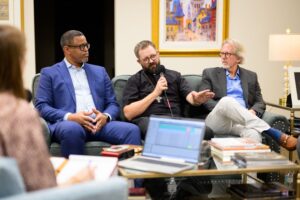
Stanley James: My congregation doesn’t know a lot about Charlie Kirk. And I think that’s what makes this such an intriguing issue with no quick, easy answers. But this might highlight a larger disconnect that exists within the Christian faith community as it pertains to who and what the church identifies with in mainstream society.
Polarizing figures can present opposition and opportunities for the gospel message regardless of which side of the political spectrum we may sit. But we must never forget that a human life (created in the image of God) should always be valued above a talking point. Romans 12:15 says, “rejoice with those who rejoice; mourn with those that mourn.”
I approach this like arriving on the scene of an accident. The police arrive to see who is in the <wrong. The paramedics arrive to see who needs help. So, I think for us we should be the latter. Let’s help those on the outskirts of faith navigate a very difficult time in America through love and unity within the Christian world.
I think this is a great moment to “practice what we preach” and come together at the one unifying truth that can never be corrupted – the cross.
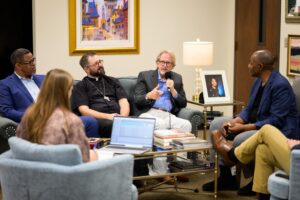
Brad Goad: I addressed it at the beginning of my sermon focusing on someone who stood up for the Gospel in the face of opposition. I did not focus on his political views, but he was a young husband and father who lived out and spoke out based on his biblical worldview.
I have been preaching through Acts and happened to be in Acts 5 where Peter and John had been put in jail for the sake of the Gospel. But an angel of the Lord let them out at night and said to “Go, stand, and speak to the people in the temple the whole message of this life.” (Acts 5:20)
In the sermon I mentioned we are worshipping freely today because of those who have gone before and stood up for the sake of the gospel in the face of opposition. I mentioned Peter, John, Paul, Timothy, and jumped to Martin Luther, John Wesley, Frances Asbury, Dietrich Bonhoeffer, Martin Luther King Jr., Charlie Kirk, and the members of Christ United who, in October 2023, stood up for the sake of the Gospel in the face of opposition to disaffiliate from the UMC.
I tried to have our folks look at it from a bigger and more eternal perspective.

Caleb Cangelosi (excerpted from his email to Pear Orchard Presbyterian the day after Kirk’s murder):
How do we as Christians respond to the murder of Kirk, a young man who was a fellow brother in Christ?
- Remember Romans 12:17-21. “Never pay back evil for evil to anyone. Respect what is right in the sight of all men. If possible, so far as it depends on you, be at peace with all men. Never take your own revenge, beloved, but leave room for the wrath of God, for it is written, ‘VENGEANCE IS MINE, I WILL REPAY,’ says the Lord. ‘BUT IF YOUR ENEMY IS HUNGRY, FEED HIM, AND IF HE IS THIRSTY, GIVE HIM A DRINK; FOR IN SO DOING YOU WILL HEAP BURNING COALS ON HIS HEAD.’ Do not be overcome by evil, but overcome evil with good.”
- Pray the imprecatory psalms. Psalms like 35, 58, 69, 94, 109, and many others ask God to judge the wicked. Sometimes Christians don’t know how or whether we should pray or sing these psalms. But the Lord has given us the whole Psalter to direct our petitions according to His will. The imprecatory psalms are one way we leave room for the wrath of God and “entrust (our) souls to a faithful Creator while doing what is right” (1 Peter 4:19).
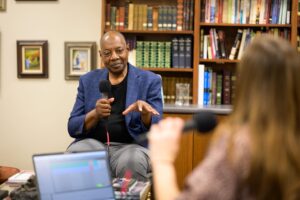
James Turner: I have seen in our community and congregation more questions about who Charlie Kirk was instead of his murder. We have tried to share that all human beings are made in God’s image and are to be loved because God is love. Colossians 3:10-15, 1 John 3:21-23.

Nevada DeLapp (in his September 14 homily, after telling the story of the good Samaritan): This is a hard story to enact. The horrifying events of this past week put our hearts to the test. Do we fantasize about the ways in which we can deal with the people who despise us? Do we enjoy the thought of them beaten up and half dead beside the road? Do we waffle with the Torah expert? ‘Who is my neighbor, exactly?’ Even righteous anger can go too far into vengeance. And this is why Jesus gives us a story – a tale that we can’t quite get out of our minds, a tale that bothers us. Jesus would have us live in the gospel story, the good news story, the hard story that is His own life.